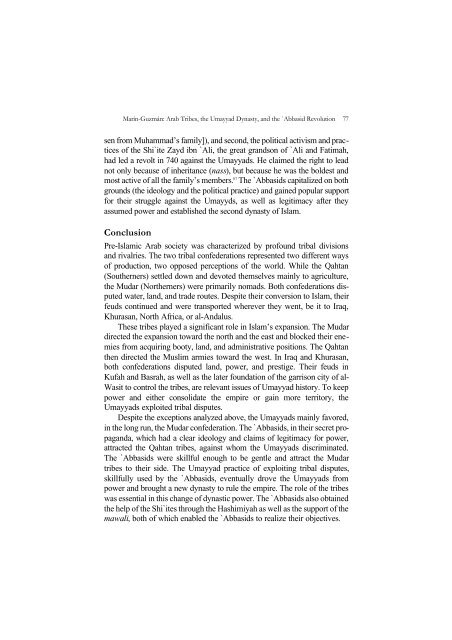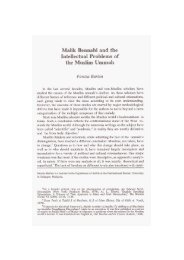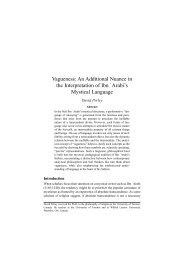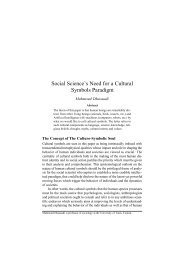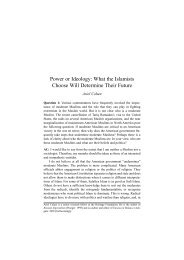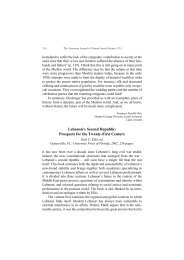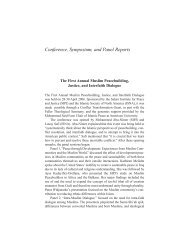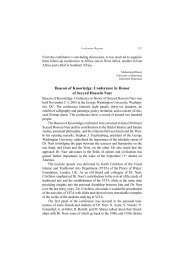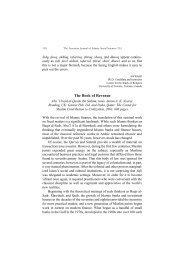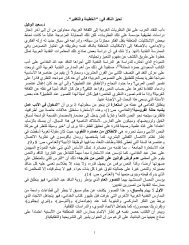Arab Tribes, the Umayyad Dynasty, and the `Abbasid ... - Epistemology
Arab Tribes, the Umayyad Dynasty, and the `Abbasid ... - Epistemology
Arab Tribes, the Umayyad Dynasty, and the `Abbasid ... - Epistemology
Create successful ePaper yourself
Turn your PDF publications into a flip-book with our unique Google optimized e-Paper software.
Marín-Guzmán: <strong>Arab</strong> <strong>Tribes</strong>, <strong>the</strong> <strong>Umayyad</strong> <strong>Dynasty</strong>, <strong>and</strong> <strong>the</strong> <strong>`Abbasid</strong> Revolution 77<br />
sen from Muhammad’s family]), <strong>and</strong> second, <strong>the</strong> political activism <strong>and</strong> practices<br />
of <strong>the</strong> Shi`ite Zayd ibn `Ali, <strong>the</strong> great gr<strong>and</strong>son of `Ali <strong>and</strong> Fatimah,<br />
had led a revolt in 740 against <strong>the</strong> <strong>Umayyad</strong>s. He claimed <strong>the</strong> right to lead<br />
not only because of inheritance (nass), but because he was <strong>the</strong> boldest <strong>and</strong><br />
most active of all <strong>the</strong> family’s members. 97 The <strong>`Abbasid</strong>s capitalized on both<br />
grounds (<strong>the</strong> ideology <strong>and</strong> <strong>the</strong> political practice) <strong>and</strong> gained popular support<br />
for <strong>the</strong>ir struggle against <strong>the</strong> Umayyds, as well as legitimacy after <strong>the</strong>y<br />
assumed power <strong>and</strong> established <strong>the</strong> second dynasty of Islam.<br />
Conclusion<br />
Pre-Islamic <strong>Arab</strong> society was characterized by profound tribal divisions<br />
<strong>and</strong> rivalries. The two tribal confederations represented two different ways<br />
of production, two opposed perceptions of <strong>the</strong> world. While <strong>the</strong> Qahtan<br />
(Sou<strong>the</strong>rners) settled down <strong>and</strong> devoted <strong>the</strong>mselves mainly to agriculture,<br />
<strong>the</strong> Mudar (Nor<strong>the</strong>rners) were primarily nomads. Both confederations disputed<br />
water, l<strong>and</strong>, <strong>and</strong> trade routes. Despite <strong>the</strong>ir conversion to Islam, <strong>the</strong>ir<br />
feuds continued <strong>and</strong> were transported wherever <strong>the</strong>y went, be it to Iraq,<br />
Khurasan, North Africa, or al-Andalus.<br />
These tribes played a significant role in Islam’s expansion. The Mudar<br />
directed <strong>the</strong> expansion toward <strong>the</strong> north <strong>and</strong> <strong>the</strong> east <strong>and</strong> blocked <strong>the</strong>ir enemies<br />
from acquiring booty, l<strong>and</strong>, <strong>and</strong> administrative positions. The Qahtan<br />
<strong>the</strong>n directed <strong>the</strong> Muslim armies toward <strong>the</strong> west. In Iraq <strong>and</strong> Khurasan,<br />
both confederations disputed l<strong>and</strong>, power, <strong>and</strong> prestige. Their feuds in<br />
Kufah <strong>and</strong> Basrah, as well as <strong>the</strong> later foundation of <strong>the</strong> garrison city of al-<br />
Wasit to control <strong>the</strong> tribes, are relevant issues of <strong>Umayyad</strong> history. To keep<br />
power <strong>and</strong> ei<strong>the</strong>r consolidate <strong>the</strong> empire or gain more territory, <strong>the</strong><br />
<strong>Umayyad</strong>s exploited tribal disputes.<br />
Despite <strong>the</strong> exceptions analyzed above, <strong>the</strong> <strong>Umayyad</strong>s mainly favored,<br />
in <strong>the</strong> long run, <strong>the</strong> Mudar confederation. The <strong>`Abbasid</strong>s, in <strong>the</strong>ir secret propag<strong>and</strong>a,<br />
which had a clear ideology <strong>and</strong> claims of legitimacy for power,<br />
attracted <strong>the</strong> Qahtan tribes, against whom <strong>the</strong> <strong>Umayyad</strong>s discriminated.<br />
The <strong>`Abbasid</strong>s were skillful enough to be gentle <strong>and</strong> attract <strong>the</strong> Mudar<br />
tribes to <strong>the</strong>ir side. The <strong>Umayyad</strong> practice of exploiting tribal disputes,<br />
skillfully used by <strong>the</strong> <strong>`Abbasid</strong>s, eventually drove <strong>the</strong> <strong>Umayyad</strong>s from<br />
power <strong>and</strong> brought a new dynasty to rule <strong>the</strong> empire. The role of <strong>the</strong> tribes<br />
was essential in this change of dynastic power. The <strong>`Abbasid</strong>s also obtained<br />
<strong>the</strong> help of <strong>the</strong> Shi`ites through <strong>the</strong> Hashimiyah as well as <strong>the</strong> support of <strong>the</strong><br />
mawali, both of which enabled <strong>the</strong> <strong>`Abbasid</strong>s to realize <strong>the</strong>ir objectives.


